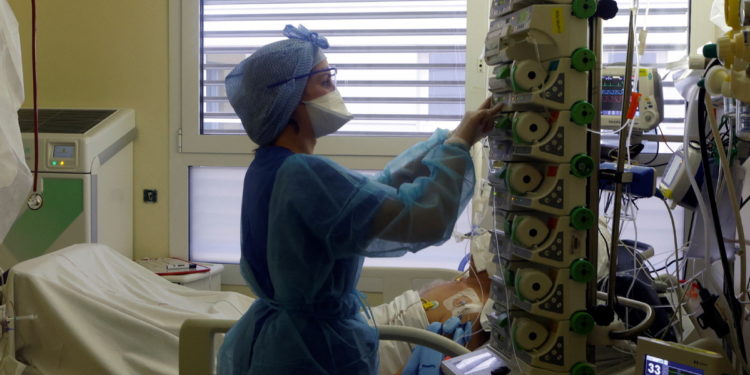The Omicron variant of the novel coronavirus is 105 percent more transmissible than the Delta strain, according to scientists in France, who say a projected February peak in infections could overwhelm intensive care units in the nation’s hospitals.
Even though preliminary analysis of the Omicron variant suggests it is less virulent than the Delta variant, the increased transmissibility seen in Omicron “has the potential to maintain critical COVID-19 activity at a high level in French hospitals, if not overloading them”, said authors of the study, which was led by the French National Centre for Scientific Research, or CNRS.
France is battling some of the highest levels of infection in Europe. The nation registered a record 332,000 new cases in a 24-hour period last Wednesday, when 246 people died of the virus. On that day, 20,000 people were in hospital with the disease, the highest number since May, and 3,695 people were in intensive care units, or ICUs.
The CNRS said the maximum national ICU capacity in France is 5,000 beds, and occupancy could exceeded that by mid-February in the most pessimistic of epidemiological modeling, in which the Omicron variant has a two-fold reduction of virulence when compared to Delta, and vaccines are 40 percent effective against it.
In the most optimistic modelling, where virulence is reduced threefold and vaccines are 80 percent effective, ICU occupations would reach around 4,000.
“Swift mitigation of the epidemic wave appears to be essential,” said authors of the study, which looked at data from 131,478 COVID-19 tests performed in France between September and December.
The study was published on preprint server MedRxiv and is yet to be peer reviewed.
Separate studies indicate two doses of COVID-19 vaccines do not provide robust protection against infection from the Omicron variant, which goes some way to explaining soaring case numbers, even in countries with high rates of vaccine coverage, such as France and the United Kingdom.
Research published on Friday by the Ragon Institute of MGH, MIT, and Harvard University in the United States indicates that one dose of the Johnson & Johnson vaccine and two shots of the mRNA vaccines from Pfizer and Moderna “do not produce antibodies capable of recognizing and neutralizing the Omicron variant”.
The Ragon Institute researchers said a booster, or third dose, of an mRNA vaccine is needed to provide immunity against the Omicron variant.
In the study, scientists constructed a harmless version of the strain, known as a pseudovirus, that was used in the laboratory to evaluate the effectiveness of the three vaccines that are widely used in the US.
The researchers then looked at the level of immune response provoked when the pseudovirus interacted with blood samples from 239 vaccinated individuals.
“We detected very little neutralization of the Omicron variant pseudovirus when we used samples taken from people who were recently vaccinated with two doses of mRNA vaccine or one dose of Johnson &Johnson,” said senior author Alejandro Balazs. “But individuals who received three doses of mRNA vaccine had very significant neutralization against the Omicron variant.”
Source: CD










